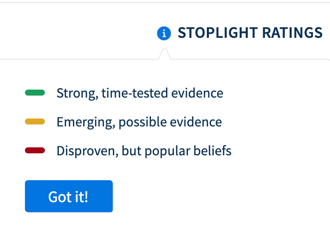
At Health Hippo, we know the power of well-organized information to help spur and clarify a decision. With our Stoplight Ratings, we color-code the information, so you know the strength of the evidence behind each finding.

Our ratings will give you the basic lay of the land for a given health condition in 10 minutes.
In healthcare, this kind of structure in the information you read is almost totally absent. Can you image what it would be like to buy a used car without Kelley Blue Book? Or buy a stock or a bond without a rating agency? All of us do that every day in healthcare when we make expensive and important decisions without any objective rating about the validity of those decisions.
Ratings provide at least two kinds of benefits and our Stoplight Ratings at Health Hippo aim to deliver on both benefits. First, to what degree is the information, on its own, true: is it absolutely true? And, second, is this information truer than another option: is it relatively true? Today, until Health Hippo, both of these problems plague the health information we consumers are able to find online. First, information is asserted as true with little substantive evidence about the degree to which it is true. The validation behind these assertions, however, can range from significantly proven, to marginally proven, to actually disproven. One of our favorite illustrations of this problem is a twitter account called @JustSaysInMice in which research scientist James Heathers retweets links to various incredulous mainstream health assertions with simply the caption “In Mice” to point out assertions that have actually only been tested with those furry little rodents, not humans. This, on its own, is not a simple problem as there are many considerations about how to validate a particular health finding.
A second problem is, perhaps, even more complicated: the limited comparative analysis available to most consumers. Should I have surgery or do physical therapy for that knee problem? Should I take medicine or change my diet to manage my hypertension? Andy Grove’s piece on the cover of Fortune magazine back in 1996 made a powerful impression about this problem. Andy, who was at the time CEO of Intel, received a diagnosis of prostate cancer and he chose to fully apply his inquisitive mind to examine and empirically resolve the contradictory advice he received about his diagnosis and treatment plan. His findings about the limited efforts in medicine, at that time and unfortunately largely true today, to apply even basic statistical techniques to comparatively rate the options for how to manage this very common disease is still jarring almost 25 years later.
We are not alone in finding this problem discomfiting. As published in the American Medical Association’s Journal of Ethics, in a 2014 piece about why costs are so high and quality so poor in US healthcare, this issue of poor comparative analysis is found to be a particular problem in the US. The authors state, “The Food and Drug Administration (FDA) in the United States approves a drug or device if it is shown to be safe and effective.” And, “there is no requirement for new drugs or devices to be more effective or less costly than existing approved regimens.” And, finally, “while the US medical workforce has extensive specialty expertise in intensive medical treatments, the current health care system may fail to prioritize low-cost, low-intensity health care interventions… that could dramatically improve overall public health.” In other words, while innovation in US health care is the envy of the world, and rightly so, it has a dark side in that meat-and-potatoes gold-standard protocols are sometimes overshadowed by the approval of the new and the novel – and those new and novel interventions may be less effective than that boring gold standard.
Despite these complexities, there is real insight that physicians do have about what works, both absolutely and relatively, to identify and manage health issues. What’s more, there are dentists, and physical therapists, and nurse practitioners, and emergency room physicians, and dietitians, and many other care providers who have a view about what works to improve health, and why. At Health Hippo, we aim to consider and bring together all of those views, in one rigorous snapshot.
Only at Health Hippo, our Stoplight Ratings provide you, the consumer, access to these insights so you can make better decisions, together with your doctor. We prioritize what is known, as vetted and validated by a wide array of physicians, medical associations, and research organizations, about specific health conditions. And, with a simple system of green, yellow, and red indicators, you gain a clear, directly-to-the-point, actionable understanding.




